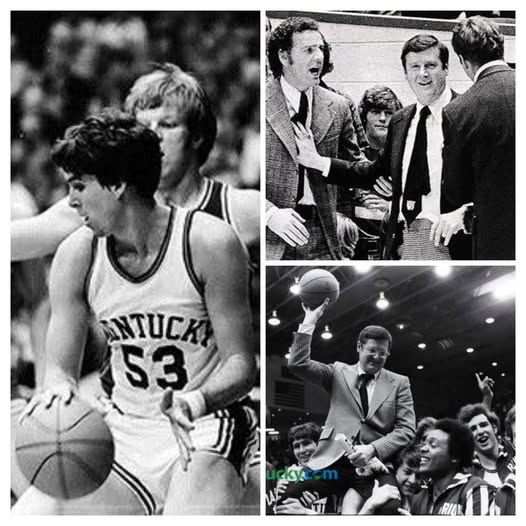The 1975 Incident That Set College Hoops on Fire: Bobby Knight’s Head Slap Sparks a Legendary Rivalry
In the annals of college basketball, few moments have ignited as much passion and controversy as the 1974–75 season’s clash between Indiana’s Bobby Knight and Kentucky’s Joe B. Hall. Their rivalry, marked by a contentious incident, would forever alter the landscape of college hoops.
The stage was set on December 7, 1974, in Bloomington, Indiana, where the top-ranked Hoosiers faced the Kentucky Wildcats. The game was a showcase of Indiana’s dominance, culminating in a decisive 98–74 victory. However, it was a post-game interaction that would become the focal point of the season.
As the game concluded, Knight approached the Kentucky bench, where Hall was seated. In a moment that would become infamous, Knight delivered a slap to the back of Hall’s head. The gesture, intended by Knight as a playful act, was perceived by Hall and many others as a profound disrespect. Hall, taken aback and humiliated, later remarked, “You don’t do that to another coach, especially in front of the fans and players.”
The incident sent shockwaves through the college basketball community. Hall, who had once considered Knight a friend, found himself at the center of a storm. His assistant coach, Leonard Hamilton, a former FBI agent standing over six feet tall, had to be restrained from confronting Knight. The tension was palpable, and the implications were far-reaching.
Knight, known for his fiery temperament and unapologetic demeanor, defended his actions as a sign of camaraderie. He claimed that the slap was something he had done “affectionately” to his own players for years. “But maybe someone would not like that,” he conceded. “If Joe didn’t like it, I offer an apology. I don’t apologize for the intent.”
Despite Knight’s explanation, the damage was done. Hall’s perception of Knight had shifted irreparably. “From that moment on, I had no respect for the guy,” Hall stated in a 2003 interview. The incident marked the end of their friendship and the beginning of one of college basketball’s most intense rivalries.
The fallout from the slap was immediate and profound. Kentucky, fueled by a desire for retribution, entered the 1975 NCAA Tournament with renewed vigor. On March 22, 1975, in Dayton, Ohio, the Wildcats faced the Hoosiers in the Mideast Regional Final. Indiana, boasting an undefeated record and a roster filled with future NBA talent, was the favorite. However, Kentucky, led by guards Mike Flynn and Jimmy Dan Conner, executed a game plan that exploited Indiana’s defensive weaknesses. The Wildcats emerged victorious with a 92–90 win, ending Indiana’s 34-game winning streak and sending Kentucky to the Final Four.
The victory was not just a triumph on the scoreboard but a symbolic reclamation of dignity. For Hall and the Wildcats, it was a statement that transcended the game itself. The win was later described by Hall as the most important of his career, a sentiment that resonated deeply with Kentucky fans and players alike.
In the years that followed, the rivalry between Knight and Hall continued to captivate the college basketball world. Their encounters were marked by intense competition, strategic brilliance, and a palpable animosity that added layers of intrigue to each matchup. The 1975 incident, though decades old, remained a touchstone for discussions about sportsmanship, respect, and the fine line between competitiveness and hostility.
Reflecting on the broader implications, the Knight-Hall saga serves as a cautionary tale about the complexities of relationships in high-stakes environments. It underscores the importance of professionalism and the potential consequences of actions that, while perhaps intended as harmless, can have lasting effects. The incident also highlights the role of media and public perception in shaping the narratives of such rivalries, often amplifying conflicts and adding fuel to the fire.
In conclusion, the 1974–75 season’s clash between Bobby Knight and Joe B. Hall was more than just a basketball rivalry; it was a defining moment that encapsulated the passion, drama, and complexities of college sports. The head slap incident, though a brief moment in time, left an indelible mark on the history of college basketball, reminding us of the fine line between camaraderie and competition, and the enduring impact of respect and rivalry in the world of sports.



